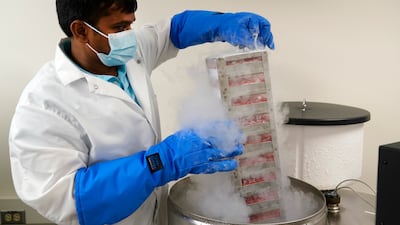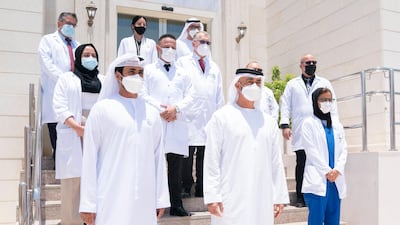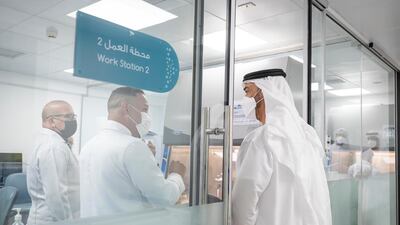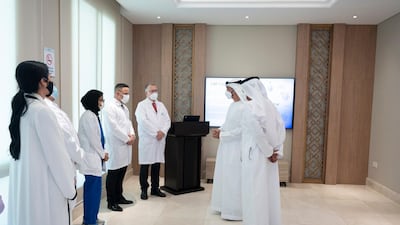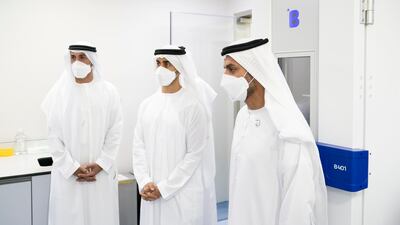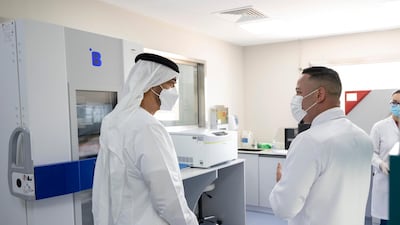Stem cells frozen to almost -200°C have been used for the first time in the UAE in a bone-marrow transplant for a man with blood cancer in Abu Dhabi.
The 41-year-old underwent the procedure at Burjeel Medical City in January and has since left hospital and is recovering well.
He was diagnosed with Hodgkin lymphoma, a cancer that required treatment with chemotherapy.
Burjeel Medical City
As this form of therapy usually destroys living stem cells, as well as cancerous ones, doctors removed the stem cells and stored them at exceptionally low temperatures.
They were returned to the patient once his treatment was complete, to grow again and regenerate bone marrow.
UAE milestone set to boost patient care
It is the first time such longer-term cryogenic freezing of healthy cells had been used in the UAE, and could pave the way for more progressive treatments in future.
“There is a huge need for this kind of procedure here, and we have a waiting list of 12 patients who will have this done over the next two months,” said Dr Humaid Al Shamsi, director of the medical oncology service at Burjeel Medical City and president of the Emirates Oncology Society.
“Using this method, these stem cells can be kept for many years, as long as the infrastructure and back-up is there.
“They can be used for mainly blood cancers, but also we are looking at how they can be used for lung cancer and possibly other blood disorders like thalassaemia.
“It will open the door to be able to complete more complex transplants in the future.”
Using the technology, cells are frozen with liquefied nitrogen and preserved at a temperature of -196°C for a period of up to 25 years.

What are stem cells?
Stem cells are raw primary cells available in the bone marrow. They produce all types of blood cells, including red and white blood cells and platelets.
Cells are extracted before the patient receives high doses of chemotherapy to protect them against severe anaemia, infections, and bleeding, as chemotherapy depletes and destroys stem cells in the bone marrow.
A process of fresh transplants, where stem cells were kept inside a regular refrigerator for three days before returning to the same patient, was already in use at BMC.
But freezing stem cells for longer periods allows chemotherapy treatment to be administered while maintaining healthy stem cells in patients who require longer therapies.
“In some cases, patients require chemotherapy for several weeks, so this process could not be used,” said Dr Al Shamsi.

“It meant patients would have to go abroad, where this kind of procedure was available.
“Now we can do it in the UAE, cancer patients can have multiple rounds of chemotherapy over the course of a few weeks without damaging their stem cells.”
The first cryopreservation of stem cells taken from one patient and given to another is likely to take place in the UAE later this year, Dr Al Shamsi said.
Stem cell science has the potential to become a game changer in health care and life expectancy, and could even prevent future pandemics.
Adult humans have huge numbers of blood-creating stem cells in their bone marrow, ranging between 50,000 and 200,000 stem cells. A fully grown human body consists of more than 37.2 trillion cells.
Mesenchymal stem cells are commonly used for regenerative medicine, with a number of studies supporting their use in therapies to treat illnesses, neurological disorders and even lung damage caused by Covid-19 induced pneumonia.
Stem cells can help to explain how some functions of the body work, and how they sometimes go wrong.
Burjeel Medical City’s integrated bone marrow transplant unit was inaugurated in September, and succeeded in conducting stem cell transplantation for three patients suffering from multiple myeloma.
The treatment allowed cells to be preserved for a maximum of 48 hours before being reinfused to the patients.
“Using this technique will make the lives of many patients easier,” said Dr Kayane Mheidly, consultant hematologist and head of the bone marrow transplant unit at Burjeel Medical City
“In the past, patients had to travel outside the UAE for bone marrow transplantation, but now they can continue treatment in their home country with close support from their loved ones.”
UAE at forefront of research
The Abu Dhabi Stem Cell Centre was established in March, 2019.
It focuses on cell therapy and regenerative medicine, as well as delivering cutting-edge research on stem cells.
Sheikh Mohamed bin Zayed, Crown Prince of Abu Dhabi and Deputy Supreme Commander of the Armed Forces, visited the centre last May.
The department has also been involved in the fight against Covid-19, including work on testing and vaccine distribution.
That was in addition to studies on stem cell treatments for rare and genetic medical diseases.
